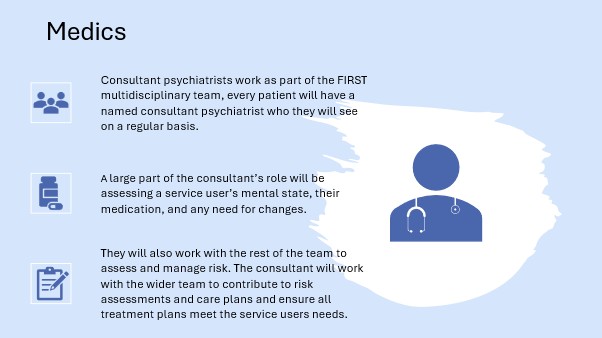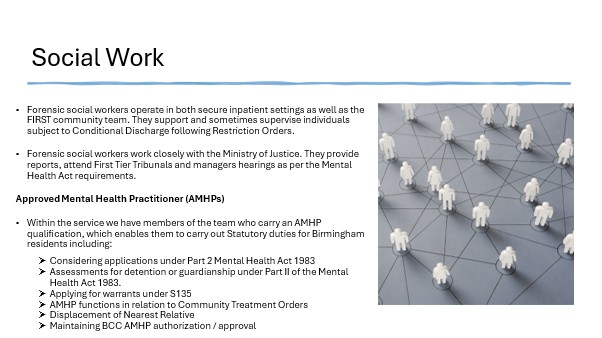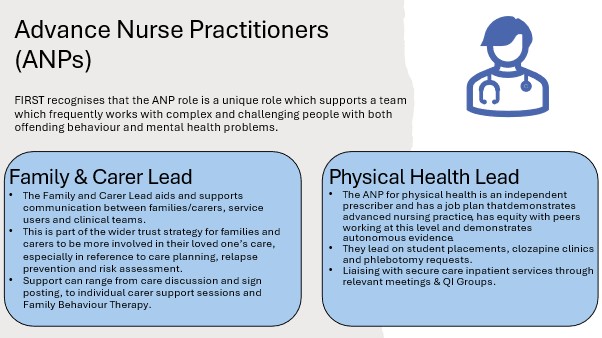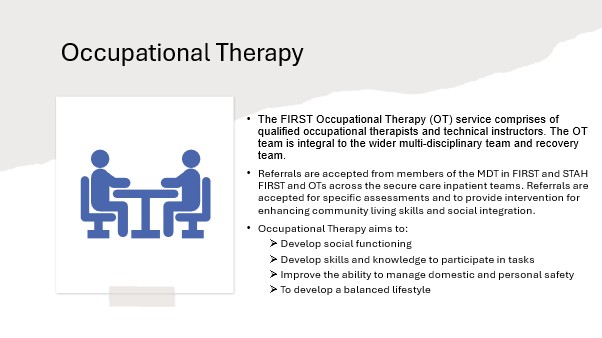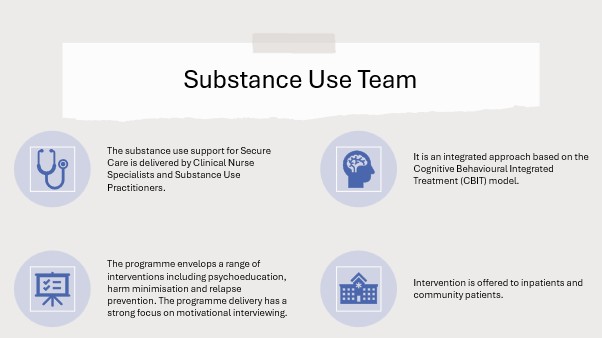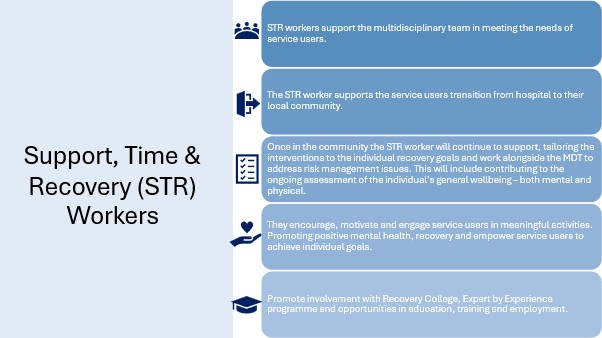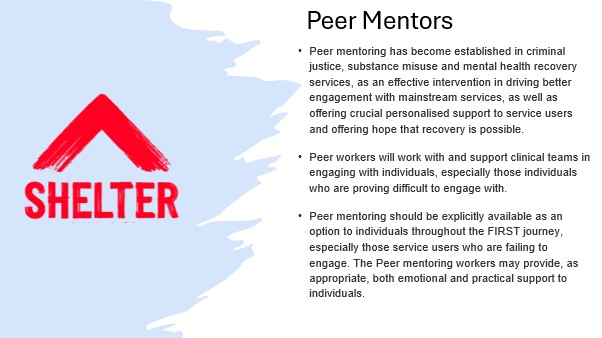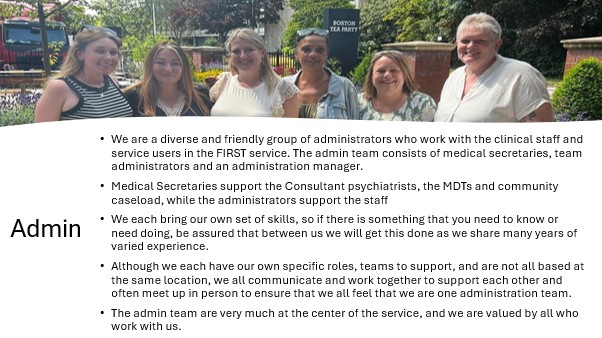FIRST – Forensic Intensive Recovery Support Team
- FIRST is a multi-disciplinary community mental health service within BSMHFT commissioned by Reach Out
- FIRST Work with secure care in-patient services to ensure a timely and seamless pathway out of hospital and to provide ongoing support in the community.
- FIRST Provide high-quality care that prevents avoidable admissions and enables the recovery of individuals who suffer from a significant mental illness who have presented as a significant risk to themselves and/or the public, in the least restrictive setting as close to home as possible.
- FIRST Work across agencies in the community to contribute to public safety and reduce reoffending.
- FIRST Work with colleagues in secondary care to ensure the timely progression from forensic specialist community services to secondary services (such as CMHT and AOT), keeping care pathways progressing and reducing stigma and inequalities.
The Team
FIRST consists of a range of disciplines that whilst mainly work in the community setting supporting patients and their families along the whole secure care pathway:
- Clinical Services Manager
- Hub Manager
- Clinical Lead
- Medics
- Social Workers, including AMHPs
- Advanced Nurse Practitioners, inc Family and Carers Lead
- Community Psychiatric Nurses (CPNs)
- Psychologists
- Occupational Therapists & Technical Instructors
- Substance Use Team
- Administration Team
- Support, Time & Recovery (STR) Workers
- Peer Mentors (in partnership with SHELTER)
Referral pathway
Referrals to Forensic Intensive Recovery Support Team (FIRST)
Referral Criteria
FIRST works to support the successful discharge of service users moving into the community from secure inpatient services commissioned by Reach Out. FIRST accepts referrals for individuals who meet the following criteria:
- Are from or residing in the West Midlands,
- Are over 18 years of age
- Do not have a moderate or severe intellectual disability.
- Have a severe and enduring mental illness (e.g. schizophrenia, bipolar affective disorder), personality disorder and/or other diagnosable mental disorder
- Whose current risk profile requires specialist forensic community care and active discharge planning has commenced.
Typical reasons for referral:
- Referrals from secure care inpatient teams if locality team are unable to provide outpatient care.
- Referrals from out of area providers/prisons for service users who are commissioned by Reach Out provider collaborative and who are ready to be discharged and repatriated back to the West Midlands.
- Please note, FIRST are not able to accept emergency / crisis referrals.
Referral Process and Requirements Please follow the steps below to make a referral to FIRST:
- Complete the FIRST data set form
- Send the following documents to the BSMHFT Secure Care Referrals inbox sccs.referrals@nhs.net (without these three documents we will not be able to process your referral):
- Completed data set form
- Referral letter from Consultant Psychiatrist (or Approved Clinician) with clear information on the reason for referral, service user needs and relevant risk information.
- An up-to-date comprehensive document that details the service user’s psychiatric and risk history (e.g. a recent tribunal report)
Please ensure the following professionals have been made aware of the referral to FIRST and that their views are included as part of the referral:
- Current care co-ordinator for the patient
- MAPPA (if relevant)
We encourage the sharing of any other relevant documents that will help inform our assessment of the referral, including Psychology and Occupational Therapy reports, risk assessment reports, any relevant diagnostic reports (e.g. for autism), etc.FIRST data set form
Maintaining a holistic, person centred, and recovery focussed approach
Individuals who are referred to us will typically have complex presentations and needs, including enduring mental health diagnoses, significant risks, and offending behaviours, as well as difficult life experiences, often including past trauma. We endeavour to take account of individuals’ diverse needs by providing care in an individualised way, focusing on their personal recovery journey. Recovery is central to the function of the team and is the key driver to all interventions provided by our multi-disciplinary team. We hold a shared focus on supporting individuals to gradually rebuild more control and autonomy in their lives, as well as developing meaningful lives, roles and responsibilities. Service users are encouraged to be actively involved in decision-making about their care pathway.
By prioritising person-centred care, we aim to ensure individuals can move from secure care into the community without unnecessary delays, for example by providing periods of enhanced support upon discharge or bespoke training for accommodation providers. Similarly, our service aims to prevent avoidable readmissions by tailoring packages of care to meet service users’ needs when in crisis in the community.
The West Midlands is one of the most ethnically diverse regions of the country. We recognise the need to ensure that service users feel that their culture and identity are understood and embraced by professionals involved in their care and that they can access culturally relevant support. This also includes access to gender responsive services, as well as peer support from people who have lived experience of mental health problems and using mental health services.
We incorporate principles of trauma-informed care into our protocols and processes, including offering choice wherever possible, endeavouring to have a consistent staff group working with individuals to help with building trusting relationships, and encouraging collaboration in our care planning process.
Collaborating with service users, colleagues and stakeholders
In our daily work, we consistently embody the values of BSMHFT. We treat everyone with respect and kindness, ensuring there is a mutual understanding and appreciation for each other’s contributions. We have achieved this by establishing meaningful relationships amongst professionals, service users, their families, and caregivers. We actively engage those who use our service, and we seek their feedback on what is working well and how things can be improved. We are committed to involving service users and stakeholders in decisions about how the service is delivered. We acknowledge that people with lived experience (experts by experience), bring valued perspectives and we involve them within decisions such as recruitment, future service activities, forums etc.
When confronted with unacceptable behaviour, we address it responsibly. We model and guide appropriate behaviour, responses, and conflict management, ensuring that a positive and collaborative atmosphere is present within our working relationships.
Family and Carer Information
We recognise that the life course of many service users in Forensic services has been subject to multiple placements change and disruption, over a large geographical area over many years. This can often put huge amounts of stress and strain on family life. Separation can cause upset and distress for those concerned, including children and young people.
We in FIRST strive to ensure that families and carers are engaged and involved meaningfully in the service user’s care and treatment throughout their care pathway. It is crucial that the service user is at the centre of this process and can communicate their wishes and feelings about who they want to be included and invited to their meetings. Strengthening and supporting family networks is vital for positive long-term outcomes for the service user and their loved ones.
The addition of a dedicated Family and Carer Lead within our service has been a positive and valued asset and highlights the strong commitment to strengthening therapeutic relationships.
Service User Experiences
More information coming soon
Working for FIRST
More information coming soon



